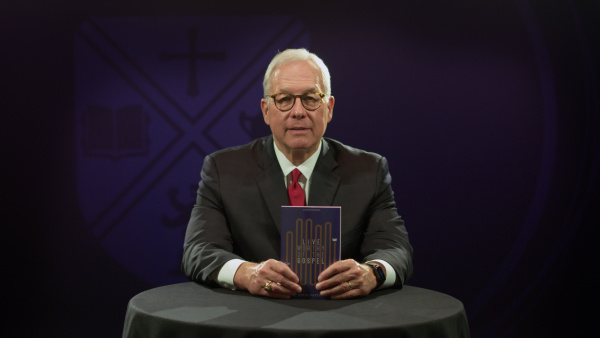PHILIPPIANS 2:14–16
Do all things without murmurings and disputings: that ye may be blameless and harmless, the sons of God, without rebuke, in the midst of a crooked and perverse nation, among whom ye shine as lights in the world; holding forth the word of life; that I may rejoice in the day of Christ, that I have not run in vain, neither laboured in vain.
Sometimes when you fly at night, the altitude and cloud patterns afford a glimpse of the earth below. You can tell where towns and cities are located by the collage of lights. Without those lights, the vast space below is pitch black. The gospel of John describes the world of unbelievers as darkness (John 1:5; 3:19). Without God, we are desolate. But He chose to enter this world and give light (1:9). Christ is “the light of the world” (8:12), and now He has called us as His people to shine this light on the backdrop of darkness all around us (Matt. 5:14).
It is our responsibility to “work out (our) own salvation” (Phil. 2:12) in every dimension of the Christian life — our relationship with God, our private lives and our relationships with others. In verses 14–16 Paul focuses his application on our relationships with fellow believers and the unbelieving society around us. Living worthy of the Gospel means displaying an honorable testimony to the world through loving unity within the church. Let’s trace Paul’s teaching in these verses by considering his command, the purpose for it, and his motivation in declaring it.
Paul’s Strong Command
PHILIPPIANS 2:14
Do all things without murmurings and disputings.
WORD STUDY
Murmurings — complaint; displeasure; secret talk; whispering
Disputings — reasoning; doubt; dispute
A major factor in our spiritual maturity is how we respond to life’s experiences. Paul exposes two wrong responses that thwart the growth and testimony of God’s children and, therefore, should be absent from our lives.
The first wrong response is murmurings. The word murmurings sounds like what it means — a low, sullen grumble of discontent. It describes the children of Israel when they complained about God’s and Moses’ leadership. On 10 occasions, they chided God and contended with Him because of their challenging circumstances. (See Ex. 14:10; 15:23–24; 16:2; 17:1–2; Num. 11:1, 3–4; 14:1; 16:3–9, 29–30; 20:2–5; 21:4–6.) God reserved His severest judgment for this sin. In another letter Paul explains, “Neither let us tempt Christ, as some of them also tempted, and were destroyed of serpents. Neither murmur ye, as some of them also murmured, and were destroyed of the destroyer” (1 Cor. 10:9–10). When the Hebrews complained, in essence, they confessed that God did not and could not care for His people. They questioned His power. They suggested that His way was not perfect but was instead hard for His people, and that He made mistakes. They tested His perfect wisdom, insinuating that He was a sinner. We often direct murmuring toward other people, but this attitude reflects a stubborn, resistant unbelief in God’s sovereign control.
While murmurings are emotional, sinful responses to trying circumstances, disputings are more calculated and premeditated, involving the reasoning process. Characteristically, our discontentment toward God results in arguments with one another. When we are guilty of dissension and quarrels with one another, and when we make excuses for our unbelief and disobedience, we are questioning God’s wisdom. At their root, these responses are forms of unbelief in God that undoubtedly stifle spiritual growth. The Holy Spirit is teaching us that controversy between believers is not merely interpersonal difficulty. Like murmuring, quarreling with one another evidences a wrong view of God.
Paul positions these prohibitions after his description of Christ’s exemplary humility. This order is insightful, because the apostle points us to Christ and then drives His example home. Complaining and arguing clearly do not exemplify the mind of Christ. He submitted His sinless will to the good pleasure of His Father, even though this meant death on a cross. Our Savior put the interests of others ahead of His own. Living for Christ is impossible without meditating on Christ.
Our Evangelical Witness
PHILIPPIANS 2:15–16
That ye may be blameless and harmless, the sons of God, without rebuke, in the midst of a crooked and perverse nation, among whom ye shine as lights in the world; holding forth the word of life.
WORD STUDY
Blameless — faultless in observable conduct; deserving no censure
Harmless — pure; innocent; free from guile
Sons — children
Without rebuke — unblemished; blameless; cannot be censured
Crooked — unscrupulous; dishonest; harsh
Perverse — crooked; perverted; misled
Shine — to manifest; to shine; to light up
World — the system opposed to God
Holding forth — to hold fast; to hold firm; to give attention to
Think back to Paul’s imperative at the beginning of our study: “Only let your conversation be as it becometh the gospel of Christ” (1:27). The purpose of contented submission to God and loving unity in the church is the promotion of the Gospel. Our obedience directly contributes to our character and influences the corrupt society in which we live. To be blameless means not having character deficiencies that are handles for others to grab hold of and discount the Gospel. Our integrity — living free of blame or rebuke for sinful actions — shines like a bright light in the midst of an unscrupulous, dark generation. To be harmless means not mixing a Christian mindset with worldliness. Our simplicity — living with genuine and sincere motives — protects us from accusations and attacks on our testimony.
When we refuse to murmur and argue, we put the powerful truth of Jesus Christ on display. As a result, the community of unbelievers sees us as genuine sons of God. God chose Israel as His “peculiar treasure” to testify of His holiness as priests to the surrounding nations (Ex. 19:5–6). But the Israelites consistently failed in this mission and became “a perverse and crooked generation,” just like the surrounding nations (Deut. 32:5). So, God sent His Son, not only as a “covenant of the (Israelite) people” but also “a light of the Gentiles” (Isa. 42:6). And He made these believing Gentiles “an holy nation, a peculiar people” by calling us “out of darkness into his marvelous light” (1 Peter 2:9–10). Therefore, our holy living within the church demonstrates our identity as “the sons of God” and shines Christ’s light to the surrounding world (Phil. 2:15). Living worthy of the Gospel means letting “your light so shine before men, that they may see your good works, and glorify your Father which is in heaven” (Matt. 5:16).
Paul then describes the key to living as God’s children — “holding (fast) the word of life” (2:16). As believers strongly grip this Gospel in their lives, its life-giving power works in the hearts of unbelievers. This series of effects is why Paul was so concerned about the way the believers live. Our character flows from the life-giving Gospel and, in turn, directly impacts its reception and progress in our community. Paul emphasizes personal holiness in all his epistles, but it is not an isolated goal. As Handley Moule observes, “A passage like this shews us how entirely (the apostles) take it for granted all the time that the Churches would never concentrate themselves upon merely their own Christian life.”[1]
An Eternal Perspective
PHILIPPIANS 2:16
… that I may rejoice in the day of Christ, that I have not run in vain, neither laboured in vain.
WORD STUDY
Rejoice — boast; glory
Day of Christ — second coming of Christ; day Christ will return from heaven
Run — to strive to advance; to make progress
Vain — empty; without content; without result
Labored — worked hard; struggled; labored to the point of exhaustion
In the end Paul had an eschatological vision in which he stood before Christ in the judgment. Paul does not mean “on the day of Christ” but rather “with the day of Christ in view.”[2] He foresaw the potential joy of that momentous event. His hope was that the race he had run and the work he had done would have eternal significance. His ability to boast, however, depended on the Philippians’ faithfulness. Paul’s ministry was effective to the degree they heeded his message.
Paul’s motivation of boasting is not arrogance. The apostle is not bragging about his own accomplishments. Rather, he is communicating a passionate concern that the Gospel run its course in the Philippians’ lives. He understands that professions of faith that do not culminate in living worthy of the Gospel are empty. They leave those who minister the truth like Paul with nothing to present to Christ for His eternal glory.
There is no question whether or not “every tongue (will) confess that Jesus Christ is Lord” (2:11). There is no question whether God who has “begun a good work in you will perform it until the day of Jesus Christ” (1:6). But your sincere effort to “work out your own salvation” is a matter that necessitates faith-filled “fear and trembling” (2:12). Paul had an eternal perspective on the importance of displaying an honorable testimony to the world through loving, gospel-focused unity within the church, and so must we.
[1] H. C. G. Moule, Philippian Studies: Lessons in Faith and Love from St. Paul’s Epistle to the Philippians (London: Hodder and Stoughton, 1904), 126.
[2] Gordon D. Fee, Paul’s Letter to the Philippians, The New International Commentary on the New Testament (Grand Rapids: Eerdmans, 1995), 248n40.
This post is from Live Worthy of the Gospel: A Study in Philippians by Steve Pettit. Copyright 2016 by BJU Press. Printed by permission of BJU Press.
This post is part of the study designed to correspond with the 2020 Fall Chapel Series. Watch the chapel message below:
Join us for chapel via live webcast at 11 a.m. every Monday and Wednesday.








